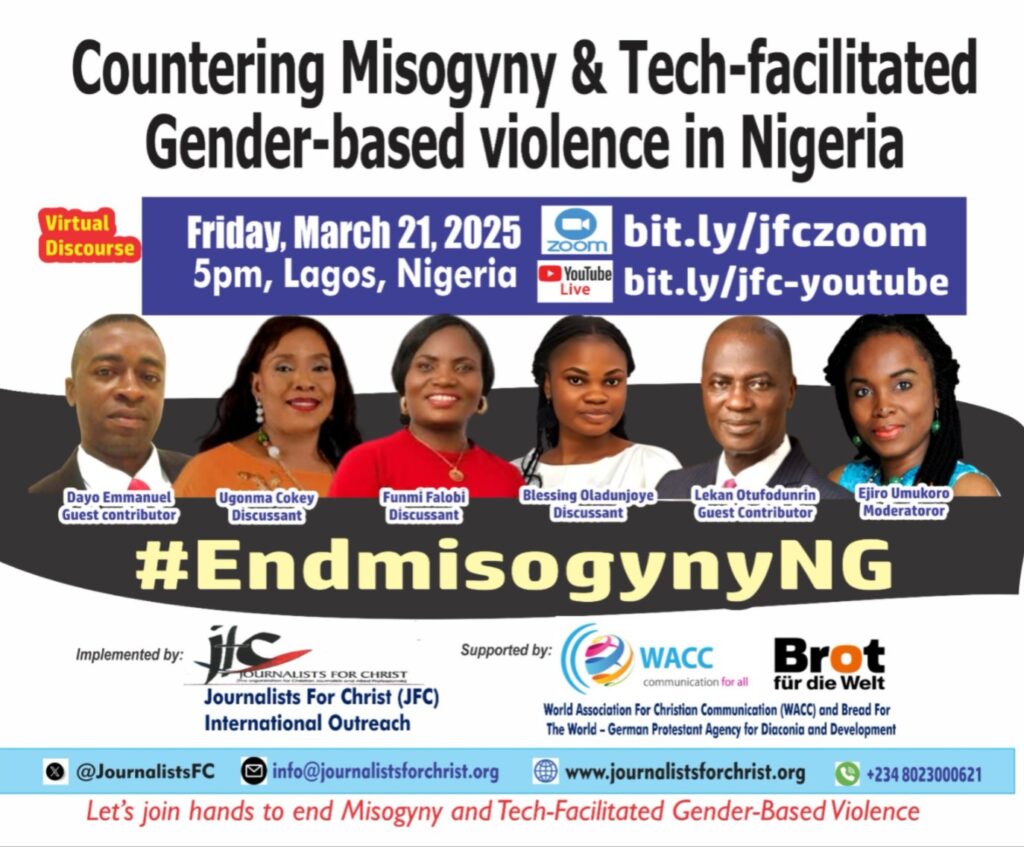From Silence to Solidarity: Confronting Misogyny and TFGBV in Nigeria’s Digital Age – Experts Weigh In
. . . Insights from a virtual discourse on countering misogyny and tech-facilitated gender-based Violence in Nigeria.
By Precious Nwonu
On March 21, 2025, Journalists for Christ organized a virtual discourse via Zoom on the theme “Countering Misogyny and Tech-Facilitated Gender-Based Violence (TFGBV) in Nigeria.” The event featured a diverse panel of discussants who shared their perspectives on the nature of misogyny, its impact on society, and strategies to combat TFGBV. The discussion was moderated to encourage insightful engagement, beginning with participants defining misogyny in their own terms.
Understanding Misogyny and Its Digital Transformation
Ugonma Cokey defined misogyny as hate speech, derogatory language, prejudice, and bias against women. She emphasized that misogyny manifests in various forms, including disdain, contempt, and discrimination against women. When applied to tech-based violence, it involves the use of technology to perpetrate harm against women, often through online harassment and digital abuse.
Dayo Emmanuel highlighted that gender-based violence has existed for centuries, but with the advent of digitalization, it has transcended into the online space, evolving into what is now recognized as Tech-Facilitated Gender-Based Violence.
Funmi Falobi provided further insight, explaining that misogyny extends beyond individual bias to systemic discrimination, particularly when men resist women in authority. With the rise of technology, this offline bias has transitioned into online harassment.
Blessing Oladunjoye noted that misogynists are typically men who exploit various forms of technology to attack women, using social media platforms as a weapon to undermine, threaten, and intimidate them.
Lekan Otufodunrin expanded on this, stating that online violence has intensified due to the anonymity provided by digital platforms, enabling individuals to insult and degrade women without fear of real-world consequences.
Ejiro Umukoro highlighted the role of patriarchy in perpetuating gender violence, emphasizing that religion, through its teachings, also contributes to this issue. She commended Journalists for Christ for their advocacy in promoting media literacy, as religious institutions hold significant influence over societal behaviors. She also introduced the concept of internalized misogyny, wherein women unknowingly adopt and perpetuate negative stereotypes about other women due to social conditioning.

Manifestations of Tech-Facilitated Gender-Based Violence
When asked about the findings from social media monitoring, Dayo Emmanuel explained that he had initiated a project to monitor platforms such as Facebook, Twitter, and Instagram. The monitoring revealed significant evidence of misogyny and online gender-based violence, which was later compiled into a publication.
According to Emmanuel, the research demonstrated that misogyny is widespread and effortlessly executed in the digital space. He further noted that users who like, comment on, or share misogynistic content are equally culpable in fostering online gender-based violence, just as much as the original posters.
Ugonma Cokey presented additional insights from her social media monitoring, identifying various forms of TFGBV, including doxxing, deepfake technology, cyberstalking, sexting, and revenge porn.
Blessing Oladunjoye also noted that cyberbullying and stalking were among the most prevalent forms of online violence. She observed that women in leadership positions, such as female politicians and entertainers, were the most frequent targets.
A notable case she cited involved the CEO of Zenith Bank, who was harassed online simply for being a woman in a powerful position. She was accused of having “slept her way to the top,” a claim that was later retracted after facing backlash.
Oladunjoye stressed that silence on these issues only emboldens perpetrators, making it crucial for society to actively speak out against such abuse. She further explained that perpetrators often target vulnerable women, including those with disabilities and those in rural communities. Their aim is to suppress women’s voices and hinder their progress, thus maintaining patriarchal control over society.
Root Causes of Misogyny and TFGBV
When discussing the underlying drivers of misogyny and TFGBV, Funmi Falobi attributed it to the deeply entrenched patriarchal nature of Nigerian society. She explained that women are often conditioned to accept limited roles, while men grow up believing they are entitled to dominate every sphere of life.
She emphasized that even women who exhibit misogynistic behavior do so because they have internalized these societal norms. Ignorance also plays a role, as many people are unaware of women’s rights and the necessity of gender equity.
Falobi further noted that TFGBV has severe psychological consequences for women, leading to self-censorship, depression, and suicidal thoughts. Many women withdraw from online spaces or refrain from pursuing opportunities due to fear of online harassment.
In extreme cases, women have taken their own lives after facing relentless digital abuse. She stressed that this issue is not unique to Nigeria but is a global problem, as technology knows no boundaries.
Lekan Otufodunrin addressed the role of religion and culture in sustaining gender-based violence and the need for religious bodies, organisations, and their leadership to address areas where religious teachings and beliefs may be enabling the scourge of #misogyny and #techfacilitated gender based violence amongst members and worshippers.





Comments